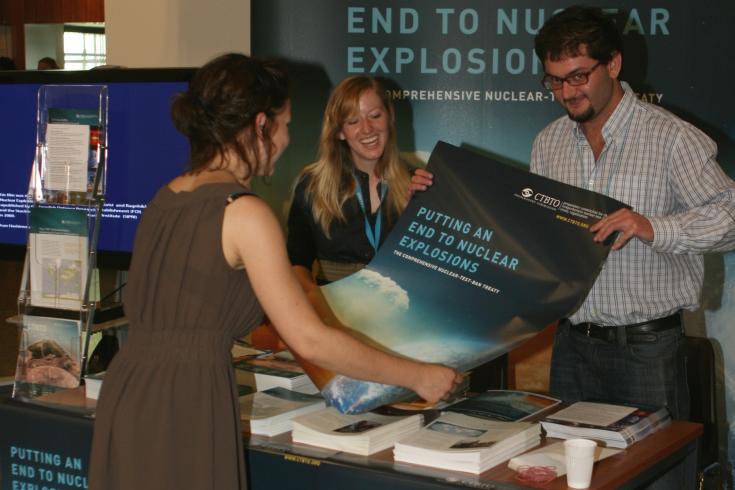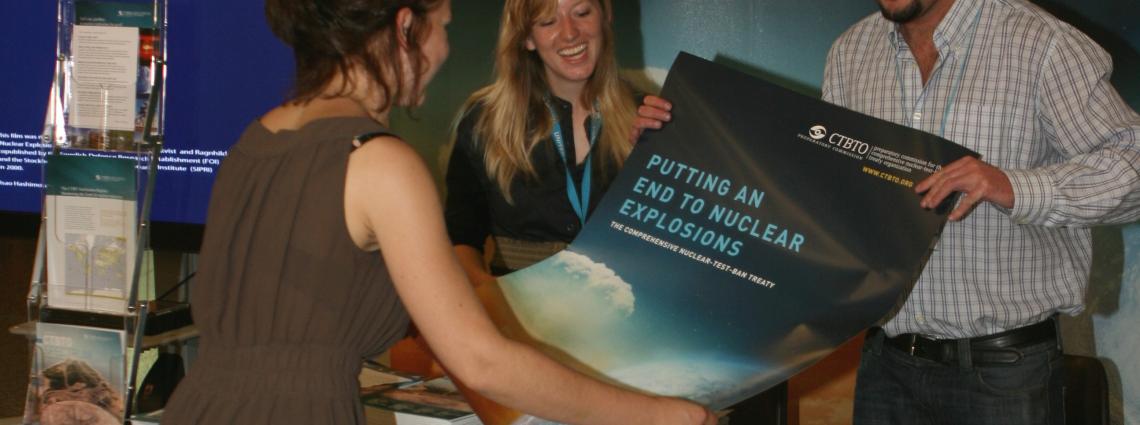On the information front
by Renata Dalaqua
Today is 12 August, 2010: the first day of the International Year of the Youth. To celebrate the start of such a special year, the United Nations headquarters in Vienna has decided to host an “open day”, which means that anybody who is under 26 can join a guided tour through the UN building for free. I am happy to know that within the UN parameters I am considered a young person; that definitely goes along with the idea that I have of myself. I am also pleased to find out that, in the capacity of being a young intern at the Preparatory Commission for the Comprehensive Nuclear-Test-Ban-Treaty Organization, also known by the acronym CTBTO, I’m required to explain to the young visitors, together with other interns, the work of the organization.
The CTBT is the treaty that, once into force, will prohibit all nuclear explosions by anyone, forever and everywhere - be it on the Earth’s surface, in the atmosphere, underwater or underground. And the CTBTO is the organization in charge of the treaty and the verification system that supports it. It’s an easy task to explain to the young audience that our aim is to make nuclear explosions illegal and, at the same time, to monitor the Earth, so that no one can cheat on the treaty. The difficult thing is to go through all the questions regarding why a country would test nuclear weapons today and why some countries haven’t ratified the treaty so far. It seems an obvious conclusion to almost everyone that nuclear explosions should be banned and that the world would be a better place if the treaty was actually in force.
Today is 12 August, 2010: the first day of the International Year of the Youth. To celebrate the start of such a special year, the United Nations headquarters in Vienna has decided to host an “open day”, which means that anybody who is under 26 can join a guided tour through the UN building for free. I am happy to know that within the UN parameters I am considered a young person; that definitely goes along with the idea that I have of myself. I am also pleased to find out that, in the capacity of being a young intern at the Preparatory Commission for the Comprehensive Nuclear-Test-Ban-Treaty Organization, also known by the acronym CTBTO, I’m required to explain to the young visitors, together with other interns, the work of the organization.
The CTBT is the treaty that, once into force, will prohibit all nuclear explosions by anyone, forever and everywhere - be it on the Earth’s surface, in the atmosphere, underwater or underground. And the CTBTO is the organization in charge of the treaty and the verification system that supports it. It’s an easy task to explain to the young audience that our aim is to make nuclear explosions illegal and, at the same time, to monitor the Earth, so that no one can cheat on the treaty. The difficult thing is to go through all the questions regarding why a country would test nuclear weapons today and why some countries haven’t ratified the treaty so far. It seems an obvious conclusion to almost everyone that nuclear explosions should be banned and that the world would be a better place if the treaty was actually in force.

Interns on the information front at the open day in the United Nations headquarters in Vienna.
I could not agree more with my young questioners and that is actually the reason that made me want to join the organization and apply for this internship. It is the Year of the Youth and maybe that means young people should become more active regarding the place in which they live and the world in which they are growing up. A part of this challenge is definitely to outlaw nuclear explosions. Since the very first one, in July 1945, more than 2000 nuclear explosions have taken place all over the globe. We are a very lucky generation, we don’t have memories regarding the bombing of Hiroshima and Nagasaki or the tensions of the Cold War. But most of us will remember that in 2009 North Korea conducted a test and that the possibility of other countries developing a nuclear weapon is a big problem today.
And make no mistake: it’s the youth who will have to take over the process of overcoming the challenges related to the abolition of nuclear explosions and also the abolition of nuclear weapons. Even though in three years I will be over 26, I hope that I can carry on the work I started as a young intern at the CTBTO and continue to spread information regarding the benefits of a world without nuclear tests and eventually without nuclear weapons.
And make no mistake: it’s the youth who will have to take over the process of overcoming the challenges related to the abolition of nuclear explosions and also the abolition of nuclear weapons. Even though in three years I will be over 26, I hope that I can carry on the work I started as a young intern at the CTBTO and continue to spread information regarding the benefits of a world without nuclear tests and eventually without nuclear weapons.
16 Aug 2010
